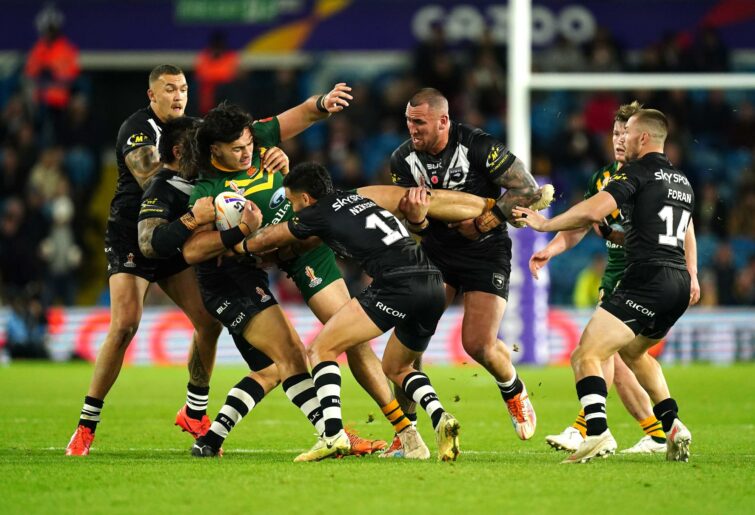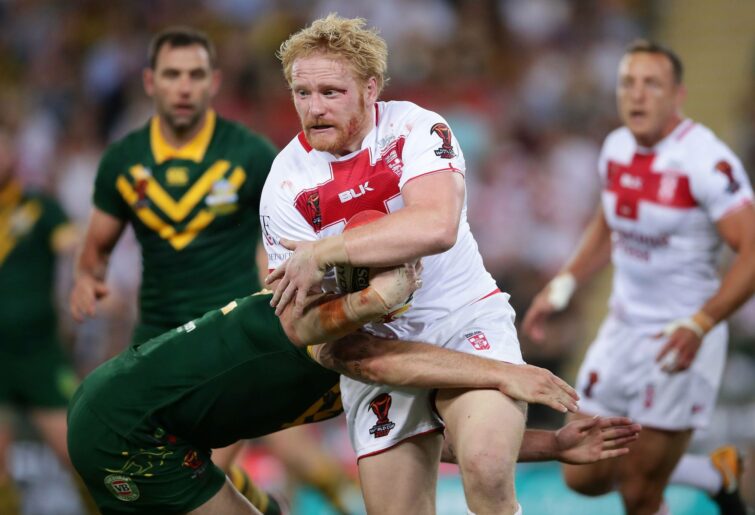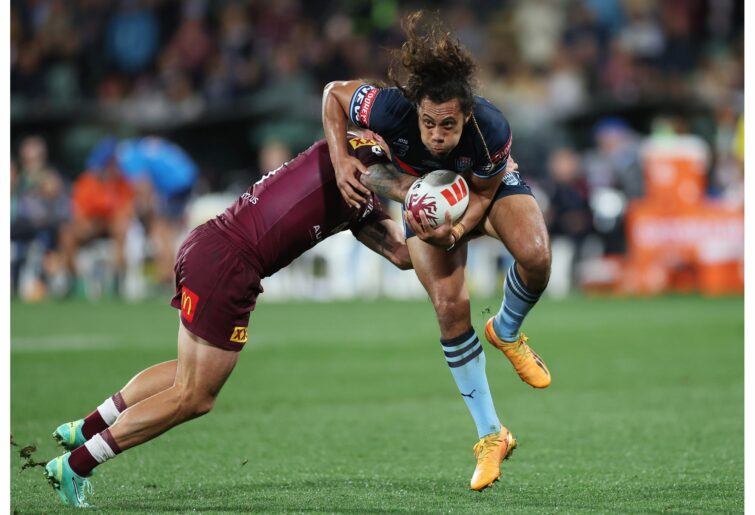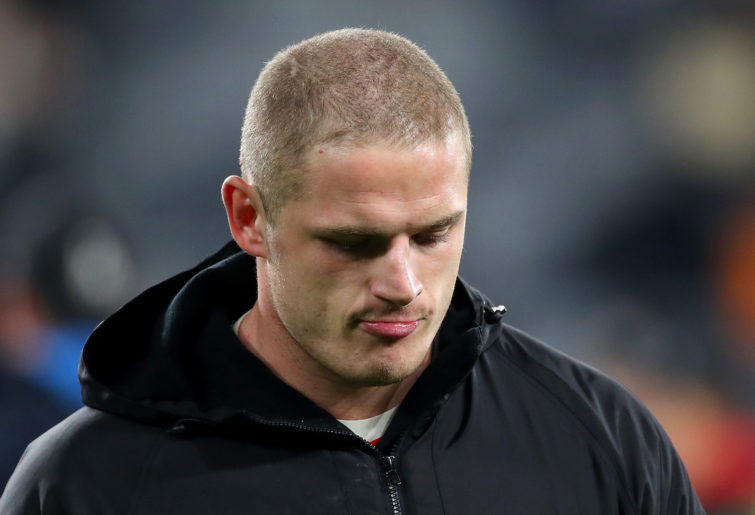If international rugby league were to issue US Presidential style ‘State of the Union’ addresses, one can only imagine that new Chairman Scott Carter would only be able to describe the state of things as parlous.
Its problems are well documented; an inconsistent international calendar, limited exposure for the game’s biggest brand – the Kangaroos – and a lack of resources, investment and long term planning in the IRFL.
Prior to State of Origin 1, The Roar featured an article by editor Mike Meehall Wood bemoaning this dreary state the international game finds itself in and arguing that Australia’s State of Origin series sat at the heart of its many troubles.
Mike’s core claim was that the prioritisation of Origin over Test footy is “a choice” and that the only reason people think “internationals aren’t worth it” is because they’ve been told that by media, sponsors etc.
As someone that has followed rugby league since I was a child in the 1980s, I am here to disabuse Mike and any others toting this line of this notion. The problems of international rugby league do have a common source, but that source is the decline of English rugby league.

(Photo by Mike Egerton/PA Images via Getty Images)
Indeed, England’s terminal decline happened in tandem with the emergence of State of Origin as the dominant representative level rivalry in psyche of Australian rugby league fans.
This has been no more of a “choice” than it has been a “choice” for so many fans to stop paying attention to the Bledisloe Cup – a series that once rivalled Origin for both ratings and attendances.
For those that are younger than 30, it is probably hard to imagine, but there was a time we did care more about International rugby league and the simple version is that it was when Australia wanted to beat the Great Britain Lions.
As a kid, I can tell you unequivocally what mattered more between Origin and test matches, and it was test matches by a fair margin. Back then, Australians could still remember the recent GB RLWC win in 1972 and also series wins on Australian soil by traveling Lions teams.
Indeed, although the tide had begun to turn in the Kangaroos favour, the history between the two sides up to that point remained a story of British dominance.
Long story short, we weren’t taking the Lions for granted, and that is reflected in just how often we were playing them in the 1980s.

(Photo by Matt King/Getty Images)
Indeed, despite Origin starting in 1980 and all the mythology around that now, the Kangaroos played seven Ashes Test series home and away between 1982 and 1994. The 1994 series would mark 11 straight victories for Australia over 21 years and it was really around that point that the care factor started to wane.
We went from rejoicing every time the Green and Gold’s taught the old enemy a lesson, to feeling like it was such a foregone conclusion that we almost felt bad for the poms.
The absolute nadir was when the Lions followed up a loss in 2001 to an underdone Kangaroos side (having cut their UK tour short following the 9/11 attacks) with a trip in 2002 to Australia in which they had 64 points piled on them by the hosts in front of an indifferent and only partially full crowd in Sydney.
This is why claims that “it is a choice” that Australian league fans care more about international league ring so hollow to many like myself. The truth of the matter is that Australians want to hate England in sport. England are our friends and family and as such make for the perfect sporting rival.
This is also why Origin works, but arguably it works more with England. We’re talking about a country with whom our sporting rivalry has at times been so bitter that it almost led to trade boycotts during the bodyline series in the Ashes.
The problem we have is that playing England/GB in Rugby League now resembles interstate Rugby League matches before Origin in that it remains familial, but more feels like you’re just watching the big brother belt the snot out of the little brother.
The only reason we continued to care into the late 80s was that Aussie were still telling ourselves that we were the little brother – and watching little brother belt big brother is interesting. But by the 90s we were coming to terms with the fact that we were big brother at that point.
This is also why Origin continued to work during Queensland’s dominant era; Origin is defined by Queensland’s sense of grievance and so their dominance isn’t a problem for the product. But whenever we’ve had runs of NSW dominance (hard to remember, I know), the claims came thick and fast that “Origin will die if Queensland stop being able to compete”.
I remember this well following the 2000 series in which NSW humiliated Queensland and then again in 2005 after NSW won threee series straight and it looked like Queensland would struggle to compete for years (until Bret Kimmorley changed history by throwing an intercept in 2006).
So now that we’ve debunked the idea that Origin is the cause of International Rugby League’s problems and that it is in fact the lack of any powerhouse international rival for the Kangaroos, the question becomes why has England been such a failure?
To my mind, the answer can be summed up in one word: London. Specifically, the failure of English rugby league to make any inroads in London of any substance.
This failure occurred in tandem with the growing preeminence of London as England’s core economic engine, the massive growth of the English Premier League and finally the professionalisation of English rugby union.
During this era, there have been many false starts for English league in London. To say the London Broncos have have had a troubled history is being extremely kind. The club have been in and out of the Super League, which included stints in which they adopted the ‘Harlequins’ moniker used in rugby union for a period and recently have dropped out of the Super League altogether.

Jarome Luai. (Photo by Mark Kolbe/Getty Images)
The fact that the RFL have been such failures in London speaks to a lack of long term planning, vision and investment.
It has let the world pass it by, never responding to change and far from growing and expanding, the game in England appears constantly on a knife edge, with it facing failing clubs and a contracting competition. Yet, whilst all this has happened, in Australia the NRL has spent the past 20 years consolidating and slow, yet succession expansion.
For all it’s faults, it’s hard not to look at the incredible success of the Melbourne Storm in the NRL and wonder what English league might look like if it it had the sort of foresight and commitment that enabled something similar in the South of England.
I’ve seen people argue that the south of England is a harder place for league to compete than a place like Melbourne because the sporting landscape is so competitive, but I call BS on that.
In Melbourne the NRL competes with 10 AFL sides to London’s 7 EPL teams, but also competes with soccer and rugby union there as well. Indeed, Melbourne was actually actively hostile to league when the Storm were first set up, which is not a dynamic I’ve witnessed in the South of England among soccer fans.
To me, this is the core problem international rugby league needs to solve. It must have a competitive England, and for that to happen, league in England needs to get out of England’s rust belt and into it’s economic heart. But to do that it needs a long term strategy that is coherent, well resourced and committed.

George Burgess. (Cameron Spencer/Getty Images)
The London Broncos aren’t the answer. They are the very definition of incoherence – even their logo is bad and looks like it was designed on MS Paint. In truth, London shouldn’t really be a single entity anyway.
The city is such a massively populated area that it probably should be split into four-five regions that have clearer identities for a team to latch onto. That’s one thing that strikes me as definitely being different about London compared to how you would approach a place like Melbourne, which is almost defined by how readily people identify as “Melbournian” before anything.
The sad truth is that English Rugby League is probably too far gone at this point, finding itself at the end of a road full of disastrous decisions and missed opportunities.
However, without it there just frankly isn’t any other obvious counterweight to the Kangaroos that would make Australians care enough to hate them, and as Origin shows, it’s the hate that makes people “choose” to watch.
The problem is that hate is earned, not chosen.
































































































